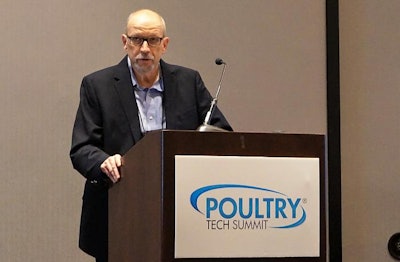
There’s much to look forward in the future of the poultry industry, according to the managing director of Tyson Ventures.
Reese Schroeder, managing director of Tyson Ventures, said the leadership of the Chicago-based investment wing of Tyson Foods Inc. considers six key areas as ripe for innovation and investment: Alternative proteins; environmental impact; digital platforms; shelf life extension; animal well-being; consumer driven platforms and the area of artificial intelligence, machine learning and automation. He spoke on November 6, 2018, as part of WATT Global Media’s inaugural Poultry Tech Summit in Atlanta.
Schroeder said the division of the largest poultry integrator in the U.S. sees a lot going on in the poultry space. He didn’t mention any names specifically, but said some of those six areas include more than 30 start-up companies it already identified. Tyson Ventures isn’t the only investor out there, either. He said major players in venture capital are ramping up their interest and involvement in the food sector and will help shape the future of food through both investment and strategic partnerships.
A focus on innovation spaces
In those six areas, he highlighted a number of sub-categories to consider.
Alternative proteins: This includes both cell-based and plant-based proteins. Tyson Ventures is currently invested in two cell-based companies, Memphis Meats and Future Meat Technologies, and a plant-based company, Beyond Meat. Alternative protein is one of Tyson Ventures’ three core investment pillars and has received the most attention so far since the area is rapidly developing.
Environmental impact: This includes recycling, wastewater solutions and sustainability in general. Sustainability is second of Tyson Ventures’ three core investment pillars.
Digital platforms: This includes farm management systems and direct-to-consumer products. Tyson Ventures recently invested in FoodLogiQ, a data platform for food safety compliance and supply chain traceability and transparency. Schroeder said the company is also an investor in Tovala, a direct-to-consumer company using a specialized, smart oven to cook prepackaged meals. The Internet of Food is the final element of Tyson Ventures’ investment pillars.
Shelf life extension: This includes novel coatings and packaging solutions to extend the life of perishable food products.
Animal well-being: This includes the use of novel technologies like drones, sensor networks and sex identification to elevate both animal welfare and animal husbandry as well as the development of new vaccines and solutions to enhance feed.
Consumer driven platforms: This area includes innovations that capitalize on consumer demand for food that is local, pasture-raised or organic. This area also includes transparency and traceability.
Artificial intelligence, machine learning and automation: This area includes the burgeoning robotic technology which is finding application both on the farm and in processing and packaging as well as inventions applying these disciplines to pathogen detection.
Tyson Ventures’ larger goals
Schroeder said the larger goal of the division is to maximize adding value to the core Tyson businesses, engage with emerging companies and technologies and generate a return on investment. Moreover, it aims to incubate the next generation of billion dollar food companies while minimizing distraction to Tyson’s core business. These investments should help grow Tyson’s own business, serve as a way to share ideas between the startups and the food giant, reinforce Tyson’s credibility with consumers and help the company stay in step with new trends and technologies.
Tyson Ventures invests out of a limited liability, wholly-owned subsidiary company of Tyson Foods. It works with a $150 million investment fund and aims to make minority investments taking no more than a 20 percent ownership stake. The fund was launched in December 2016 and currently counts five companies in its investment portfolio.



















